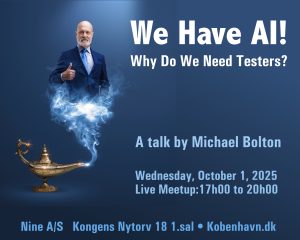
Join us for a live meetup at Nine‘s offices in Kongens Nytorv, Copenhagen!
Technology can reduce work, make people’s lives easier, and eliminate human error. Or it can disempower us, mislead us, and destroy our data. Which is it? How will things go? We may have our hopes and fears for the products we build, but we don’t have to settle for unwarranted beliefs and assumptions – we can get facts and hard evidence.
That’s what testers are for. Science helps us learn about the way things work in the physical and social worlds, and testing does the same for software. Testing is to technology what science is to the wider world: a set of beliefs, principles, and practices by which we learn from experiencing, exploring, and experimenting to help us get to truths about things.
But now that we’ve got LLMs and GPTs and agentic AI, do we really need testers? Yes, and more than ever! Machine learning models are generated and selected, not developed by conscious, intentional thought. As such, they’re even more vulnerable to inaccuracy and misalignment than software has ever been. As powerful as AI might be, and reliable as it might become, it cannot replace testers because it can’t experience software as a socially competent human actor.
Michael Bolton identifies why dedicated testers, with perspectives at a distance from those of the builders and the business, are helpful in finding trouble that matters. That role is important, because finding trouble is the first step towards making things better.
Hosted By Hassan Bugti (Qalibrate) and Jens Christian Christiansen (Nine A/S)